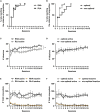Motor impulsivity but not risk-related impulsive choice is associated to drug intake and drug-primed relapse
- PMID: 37333480
- PMCID: PMC10275384
- DOI: 10.3389/fnbeh.2023.1200392
Motor impulsivity but not risk-related impulsive choice is associated to drug intake and drug-primed relapse
Abstract
Introduction: Motor impulsivity and risk-related impulsive choice have been proposed as vulnerability factors for drug abuse, due to their high prevalence in drug abusers. However, how these two facets of impulsivity are associated to drug abuse remains unclear. Here, we investigated the predictive value of both motor impulsivity and risk-related impulsive choice on characteristics of drug abuse including initiation and maintenance of drug use, motivation for the drug, extinction of drug-seeking behavior following drug discontinuation and, finally, propensity to relapse.
Methods: We used the Roman High- (RHA) and Low- Avoidance (RLA) rat lines, which display innate phenotypical differences in motor impulsivity, risk-related impulsive choice, and propensity to self-administer drugs. Individual levels of motor impulsivity and risk-related impulsive choice were measured using the rat Gambling task. Then, rats were allowed to self-administer cocaine (0.3 mg/kg/infusion; 14 days) to evaluate acquisition and maintenance of cocaine self-administration, after which motivation for cocaine was assessed using a progressive ratio schedule of reinforcement. Subsequently, rats were tested for their resistance to extinction, followed by cue-induced and drug-primed reinstatement sessions to evaluate relapse. Finally, we evaluated the effect of the dopamine stabilizer aripiprazole on reinstatement of drug-seeking behaviors.
Results: We found that motor impulsivity and risk-related impulsive choice were positively correlated at baseline. Furthermore, innate high levels of motor impulsivity were associated with higher drug use and increased vulnerability to cocaine-primed reinstatement of drug-seeking. However, no relationships were observed between motor impulsivity and the motivation for the drug, extinction or cue-induced reinstatement of drug-seeking. High levels of risk-related impulsive choice were not associated to any aspects of drug abuse measured in our study. Additionally, aripiprazole similarly blocked cocaine-primed reinstatement of drug-seeking in both high- and low-impulsive animals, suggesting that aripiprazole acts as a D2/3R antagonist to prevent relapse independently of the levels of impulsivity and propensity to self-administer drugs.
Discussion: Altogether, our study highlights motor impulsivity as an important predictive factor for drug abuse and drug-primed relapse. On the other hand, the involvement of risk-related impulsive choice as a risk factor for drug abuse appears to be limited.
Keywords: aripiprazole; cocaine; dopamine; drug abuse; motor impulsivity; risk-related impulsive choice; self-administration (SA).
Copyright © 2023 Arrondeau, Urueña-Méndez, Bellés, Marchessaux, Goutaudier and Ginovart.
Conflict of interest statement
The authors declare that the research was conducted in the absence of any commercial or financial relationships that could be construed as a potential conflict of interest.
Figures





References
-
- American Psychiatric Association (2013). Diagnostic and statistical manual of mental disorders: DSM-5, 5th Edn. Arlington, VA: American Psychiatric Association.
-
- Anderson S. M., Schmidt H. D., Pierce R. C. (2006). Administration of the D2 dopamine receptor antagonist sulpiride into the shell, but not the core, of the nucleus accumbens attenuates cocaine priming-induced reinstatement of drug seeking. Neuropsychopharmacology 31 1452–1461. 10.1038/sj.npp.1300922 - DOI - PubMed
LinkOut - more resources
Full Text Sources

